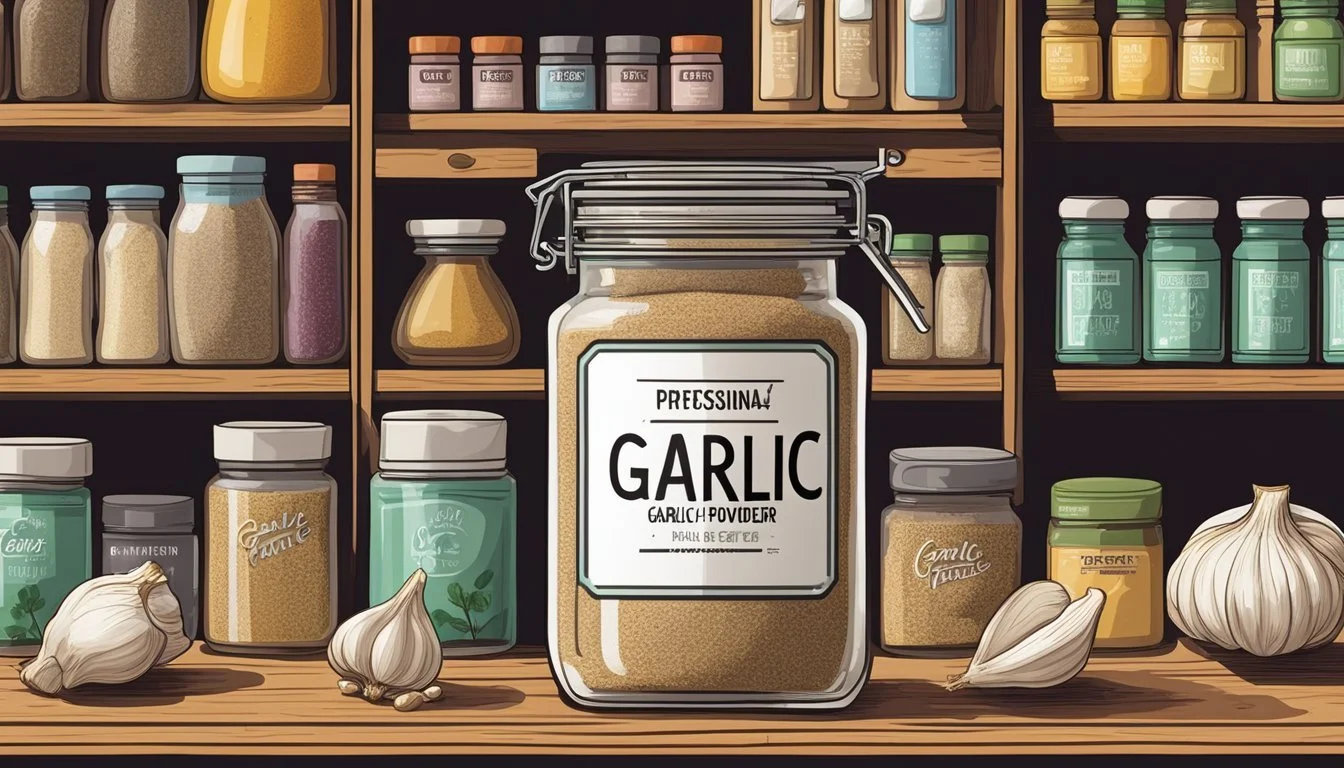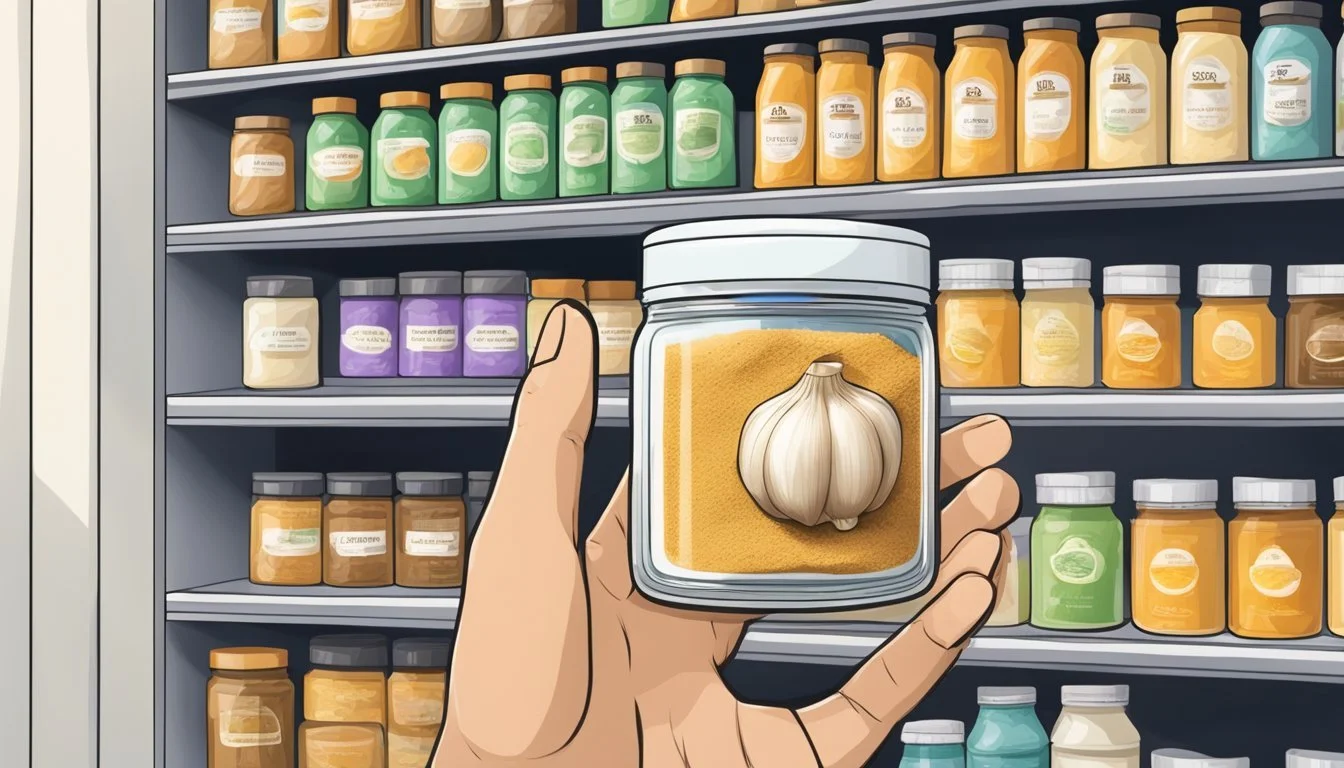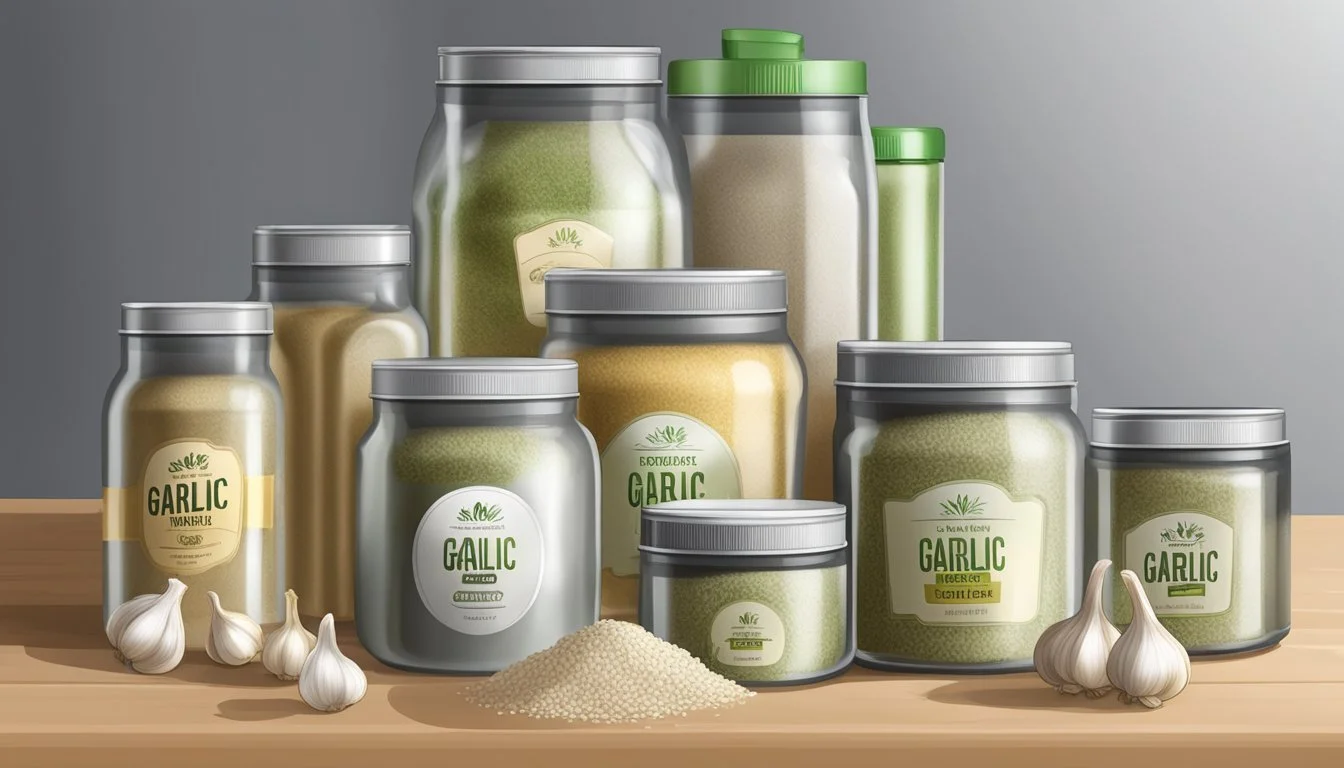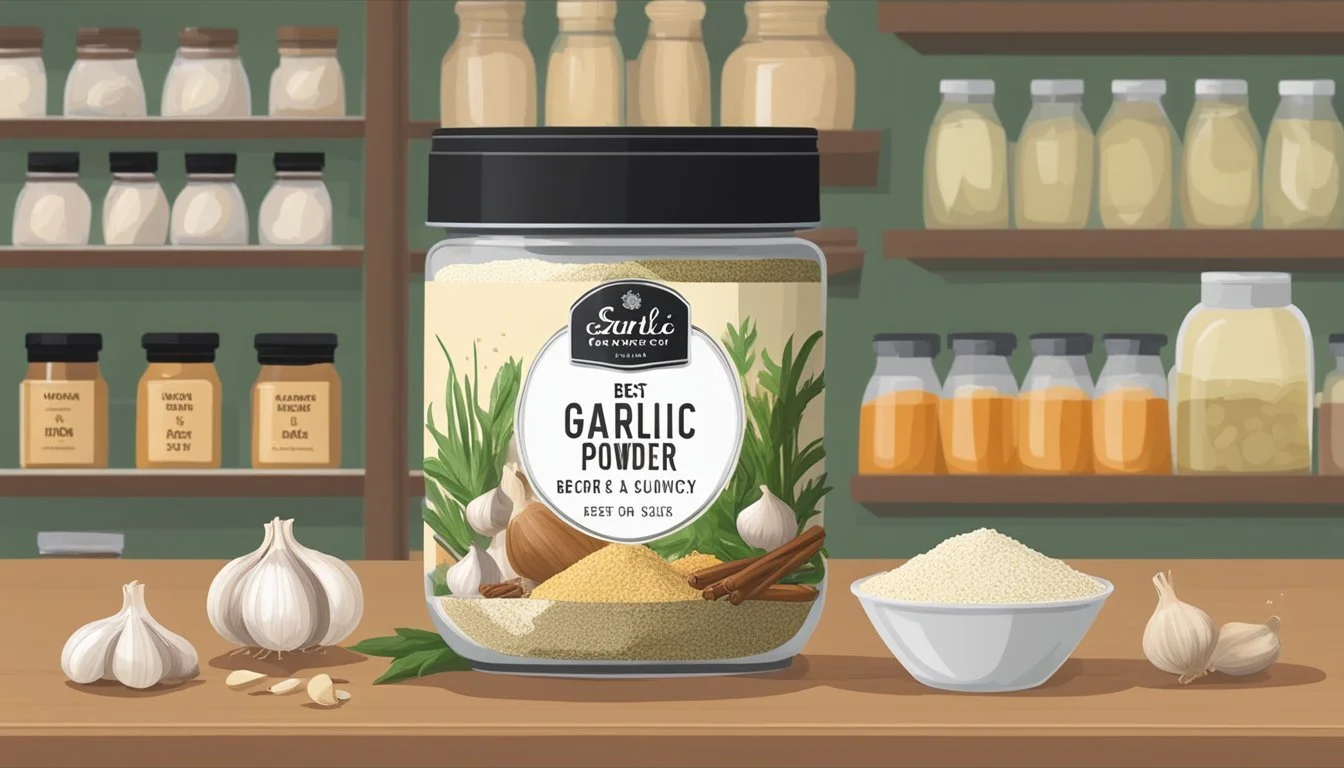How Long Does Garlic Powder Last?
Understanding Shelf Life and Storage Tips
Garlic (What wine goes well with garlic?) powder is a staple in many kitchens, valued for its longevity compared to fresh garlic and its ability to provide a concentrated flavor. As a dehydrated form of garlic, this spice offers an extended shelf life, typically ranging between 3 to 4 years if stored properly. The decline in its potency does not equate to spoilage in a traditional sense, but rather a gradual reduction in flavor intensity over time.
Storage conditions play a crucial role in maintaining the quality of garlic powder. To retain its potency and prevent degradation, it should be kept in a cool, dark place, away from heat and light, and within an airtight container. While garlic powder does not expire in a way that poses health risks, its flavor profile is best preserved within the stated shelf life.
Despite the enduring nature of garlic powder, users can detect its freshness through aroma and taste. A potent, characteristic garlic smell indicates good quality, whereas a lack of aroma or an off smell suggests it may not provide the desired flavor enhancement to dishes. It's important for consumers to note that while garlic powder remains safe to use beyond its optimal shelf life, the spice's contribution to a meal may be diminished as time passes.
Understanding Garlic Powder
Garlic powder is a common seasoning derived from dehydrated garlic used worldwide for its convenience and long shelf life. This section will explore its definition, comparison with fresh garlic, and health implications.
Definition and Characteristics
Garlic powder is dehydrated garlic grounded into a fine powder. It offers a milder flavor compared to fresh garlic. The quality of garlic powder is determined by its aroma and potency. A fresh, quality garlic powder should have a recognizable garlic scent and a robust flavor profile. It is essential to store it in a cool, dry place to maintain its flavor and extend shelf life, which can be 3 to 4 years.
Comparison with Fresh Garlic
While it cannot completely replicate the flavor of fresh garlic, garlic powder is a convenient substitute for fresh garlic. One distinct advantage of garlic powder is its shelf stability, allowing it to last longer without spoiling. When using in recipes, a general guideline is that 1/4 teaspoon of garlic powder can be substituted for one clove of fresh garlic.
Health Benefits of Garlic Powder
Garlic powder retains many of the health benefits associated with fresh garlic. It contributes to heart health and boosting the immune system, among other benefits. Although the dehydration process may reduce some nutrients, garlic powder still supports a healthy diet when used in moderation.
Storage Insights
Preserving the freshness and potency of garlic powder largely hinges on proper storage methods. This section delves into the ideal storage conditions, factors that can influence potency, and strategies to extend the shelf life of garlic powder.
Ideal Storage Conditions
Garlic powder retains its quality best when stored in a cool, dry place away from direct sunlight. It is essential to keep it well-sealed in an airtight container to protect it from moisture, which can foster mold growth, and air, which can diminish its flavor.
Factors Affecting Potency
The primary factors impacting the potency of garlic powder are heat, light, and moisture. Exposure to these elements can degrade the powder faster, leading to a loss of flavor and effectiveness. Therefore, it should not be stored near stoves, under direct lights, or in damp areas.
Extending Shelf Life
To extend the shelf life of garlic powder:
Store in freezer: Placing garlic powder in an airtight container or freezer bag and storing it in the freezer can help maintain its quality.
Refrigerator storage: While not as common, it can be kept in a refrigerator, though it may be prone to clumping due to the moisture.
Proper containers: Transfer garlic powder from its original packaging to more robust containers with tight-fitting lids to better retain flavor and potency.
By adhering to these focused storage tips, one can ensure the garlic powder remains a flavorful addition to dishes far longer.
Shelf Life and Expiration
Garlic powder is a staple in many kitchens due to its long shelf life and enduring flavor. It is important for consumers to recognize the typical duration of freshness and the indicators that garlic powder may no longer be suitable for use.
Average Shelf Life
Garlic powder typically lasts for three to four years when stored properly. The key factors contributing to its longevity are the absence of moisture, exposure to light, and extreme temperatures. To retain its quality, garlic powder should be kept in an airtight container and placed in a cool, dark area such as a pantry or cupboard.
Understanding Expiration Dates
The expiration date or best by date on garlic powder is not an absolute indicator that the spice has expired. Rather, these dates serve as a guideline for when the garlic powder is expected to retain optimal flavor and potency. After the indicated date, garlic powder may gradually lose its zest but can still be safe for consumption if there are no signs of spoilage.
Signs of Spoilage
Expired garlic powder might exhibit certain changes indicating it is time to discard it. These signs include:
Smell: A loss of the characteristic garlic aroma or the presence of an off or unusual odor.
Clump: Excessive clumping beyond normal caking due to moisture absorption.
Mold Growth: Any visible mold or signs of rot, which are direct indicators the garlic powder has gone bad and should not be used.
Consumers are advised to assess these factors when determining the viability of their garlic powder to ensure both safety and flavor in their cooking.
Usage Tips for Garlic Powder
Garlic powder is a versatile spice that imparts zing and flavor to an array of dishes. Understanding how to use it efficiently can enhance your recipe results vividly.
Culinary Uses
Garlic powder serves as a practical and potent alternative to fresh garlic. It's essential in spice blends and seasoning blends, working wonders in dry rubs for meats, flavoring marinades, and lending an aromatic depth to sauces. Different from its fresh counterpart, garlic powder is ideal for recipes involving cooking and baking where moisture content must be controlled.
Testing Potency Over Time
Over time, garlic powder can lose potency, with its pronounced taste gradually fading. To test its strength, assess its aroma; a pungent smell indicates that the garlic powder still retains its vigor. Additionally, a quick taste test is effective—garlic powder at peak quality should deliver a strong, immediately recognizable garlic flavor without any bitterness.
When to Replace Garlic Powder
Garlic powder typically has a shelf life of 3 to 4 years when stored properly. However, it should be replaced if there is any noticeable loss in flavor or if it has exceeded the expiration date. A lack of aroma or a change in appearance can signal that the garlic powder has passed its best quality phase and it no longer offers its full flavor profile to dishes. Always store garlic powder in an airtight container in a cool, dark place to maximize its shelf life.
Purchasing and Handling
When acquiring garlic powder, considerations of quality, packaging, and intended usage significantly influence the purchasing decision and subsequent handling to ensure optimal freshness and flavor retention.
Selecting High-Quality Garlic Powder
To ensure high-quality garlic powder, one should look for indicators of prime processing such as a uniform texture without any clumps. The color should be a consistent light yellowish-tan, signaling proper drying and grinding of the garlic cloves' skin. High-quality garlic powder often offers a robust flavor profile, preserving the spices' natural oils, which contribute to its overall quality.
Buying in Bulk vs. Small Quantities
Purchasing garlic powder in bulk can be cost-effective, but may lead to a reduction in flavor and freshness over time. On the other hand, buying in smaller quantities ensures the powder remains potent, especially if the frequency of use is low. It is essential to assess the rate of consumption against the:
Shelf life: Typically 3 to 4 years for unopened containers.
Usage patterns: Will determine the ideal purchase size.
Maintaining Product Integrity
To maintain the garlic powder's integrity, proper storage is crucial. It should be kept in an airtight container and stored in a cool, dry place away from direct sunlight to protect its essential flavor compounds. Avoid exposure to moisture as it impacts the texture and can lead to bacterial growth, compromising the powder's quality and safety. Regular checks for changes in flavor, color, or texture help determine the freshness of the powder.
Alternative Storage Methods
In diversifying storage methods, one ensures the extended longevity and maintains the quality of garlic powder. Consideration of temperature, light, and moisture plays a pivotal role.
Freezing Garlic Powder
Freezing can be an unconventional but effective method for storing garlic powder. Placing the powder in an airtight container or heavy-duty freezer bag can protect it from moisture and preserve its freshness. While garlic powder doesn't typically require freezing due to its long shelf life, this method can extend it further, but it is crucial to ensure that it's completely sealed to prevent condensation.
Differences in Storing Garlic Salt and Powder
Storing garlic salt differs from garlic powder as it has added salt, which may contribute to clumping due to moisture absorption. It is essential to store both garlic salt and powder in a cool, dark place to prevent caking and to maintain potency. For garlic salt, the inclusion of silica gel packets or uncooked rice grains in the container can help absorb excess moisture.
Effects of Sunlight and Heat Sources
Exposure to sunlight and heat sources has a detrimental effect on garlic powder. Storing it away from direct sunlight and direct heat like stoves or ovens is critical. A pantry or cupboard, ideally away from the stove, oven, or areas that experience significant temperature fluctuations, is suitable for preserving the quality of the spice. Sunlight and heat can lead to loss of flavor and color, with the powder potentially turning yellow and stale.
Garlic Powder in Home Cooking
Garlic powder serves as a versatile ingredient for home cooks, allowing the enhancement of flavors in a variety of dishes without the need for fresh garlic. Its longevity on the spice rack and ease of use make it a staple in culinary preparations.
Versatile Ingredient for Home Cooks
Garlic powder offers a distinct advantage in home cooking due to its long shelf life and consistent flavor. Home cooks often opt for it as it remains potent and effective for seasoning dishes for up to 3 to 4 years when stored at room temperature in a cool, dry place. It saves preparation time and is ideal for those who either lack fresh garlic or need an immediate garlic flavor in their cooking.
Incorporating Garlic Powder into Spice Blends
Many chefs and home cooks create their own spice or seasoning blends, combining garlic powder with other spices like paprika, black pepper, and dried herbs. Such blends are not only convenient for everyday cooking but also benefit from the garlic powder's ability to maintain its flavor over time. Spice blends can simplify the cooking process, leading to a consistent taste in various dishes.
Example of a basic seasoning blend:
2 parts garlic powder
2 parts onion powder
1 part paprika
1 part black pepper
Optional: 1 part dried thyme (how long does dried thyme last?) or rosemary
Enhancing Soups and Stews
In soups and stews, garlic powder acts as a flavor foundation that can be tailored to the cook's preference. Its ability to distribute garlic flavor evenly throughout the liquid makes it a superior choice in many liquid-based dishes. A sprinkle of garlic powder can give soups and stews a subtle yet impactful taste without the need for extensive simmering required to mellow out fresh garlic.
Understanding Longevity and Potency
In the culinary world, the longevity of garlic powder and its potency are crucial for maintaining the quality of flavor in dishes. Both factors—longevity and potency—are influenced by specific conditions and can be preserved through certain techniques.
Factors That Affect Longevity
Garlic powder's longevity can be influenced by several factors:
Storage Conditions: To maximize shelf life, garlic powder should be stored in a cool, dark place away from heat and light.
Moisture Exposure: Any exposure to humidity or moisture can accelerate spoilage.
Packaging: Airtight containers are essential in preserving garlic powder's quality.
The aforementioned conditions have a direct impact on not only the powder's longevity but also on retaining its pungent flavor.
Determining Potency Loss Over Time
Over time, garlic powder can lose its potency, which is often noticeable in:
Aroma: A loss of strong, characteristic smell can indicate a decrease in potency.
Flavor: Garlic powder that has lost potency will have a less pungent taste.
To test for potency loss, one should assess both the aroma and flavor periodically.
Techniques for Preserving Potency
To ensure the preservation of garlic powder's potency, one should employ the following techniques:
Airtight Storage: Keeping garlic powder in containers with tight-fitting lids can help maintain its potent flavor.
Proper Handling: Minimize exposure to air by closing containers quickly after use.
Monitor for Signs of Aging: Regular checks for changes in aroma and taste can help determine if the garlic powder is losing potency.
By adhering to these techniques, the garlic powder’s potency and resultant flavorful contribution to dishes can be preserved over time.








